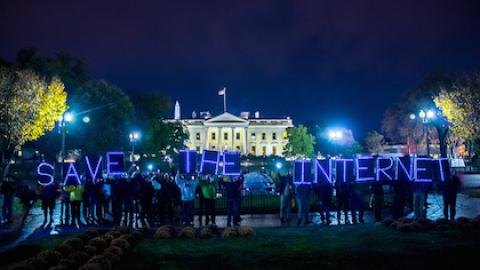As a movement crystallizes around the future of the Internet, more than 35 human rights and technology organizations from 19 countries have come together as a new coalition to define and protect the idea of 'net neutrality' as they lead what they say is a global battle to protect the Open Internet and online freedom.
The numerous and diverse groups—coming together as the 'This Is Net Neutrality' coalition—released a joint statement (made available in eleven languages) expressing their shared purpose:
The open Internet has fostered unprecedented creativity, innovation and access to knowledge and to other kinds of social, economic, cultural, and political opportunities across the globe.
Today, this open Internet is endangered by powerful service providers seeking to become gatekeepers who decide how users can access parts of the Internet. We don't want to prevent these companies from using reasonable and necessary methods to manage their networks, but these acts cannot be a pretext to eliminate openness nor to police content.
The fundamental openness of this crucial technology must be preserved, and to this end we offer the resources on this site for activists, academics, policy makers and technologists who share our vision.
The coalition, as their name suggests, also released a shared defintion of the term 'net neutrality' that all members would use moving forward. It reads:
Net neutrality requires that the Internet be maintained as an open platform, on which network providers treat all content, applications and services equally, without discrimination.
"From Afghanistan to Zimbabwe, we have to enshrine net neutrality into law so that the internet remains a platform for free expression and innovation," the group said in a statement (pdf).
Marianne Diaz Hernandez, director of Acceso Libre, a Venezuelan group and member of the coalition, said the international effort reveals "how important net neutrality is for the preservation of freedom of speech, access to information, and knowledge all over the world."
Deji Olukotun, senior advocacy manager at Access, which is also joined in the alliance, writes, "Net neutrality is not an American issue, or a European issue, or an African issue. It is increasingly a global human rights issue."
The alliance includes rights watchdogs like Witness and Article 19; organizations that focus on the intersection between human rights and technology, such as the Electronic Freedom Foundation (EFF), Public Knowledge, and Free Press; environmental nonprofits like Greenpeace; and a swath of international groups, including OpenMedia.ca, European Digital Rights, and Paradigm Initiative Nigeria, among others.
Dozens of nations are represented by the new coalition, including Pakistan, where the government in recent years has censored Facebook, YouTube, and other websites for allegedly posing a threat to national security or publishing blasphemous material. Mohammad Farooq of Digital Rights Foundation said of the coalition, "The significance of net neutrality in Pakistan cannot be ignored... Net neutrality can help raise awareness about internet censorship issues and champion the cause of internet freedom and the right to free speech worldwide."
Part of the struggle to reclaim advocacy for net neutrality is the complex terminology that, as Olukotun explains, is often subject to "misdirection by lobbyists."
The coalition, he said, is "championing the cause of an open internet by pushing for laws and policies that protect the features that made the internet what it is today."
Jeremy Malcolm, EFF senior global policy analyst, similarly explains, "We love the openness and accessibility of the internet, but we worry about it coming under threat from those who want to surround it with gates and toll booths. In cases where market competition isn't sufficient to dispel these threats, open internet rules can help."
On November 10, President Barack Obama called on the Federal Communications Commission to "recognize that broadband service is of the same importance and must carry the same obligations as so many of the other vital services do," such as electricity and the telephone, and to adopt "the strongest possible" net neutrality rules, a move that was lauded by internet content providers and consumer advocacy groups.
Internet service providers criticized the statement, saying strict regulations could stifle online investments and innovation. But as Malcolm and EFF staff technologist Jeremy Gillula write:
This definition doesn't imply that Internet providers can't use reasonable methods to manage their networks, for example to ensure that all applications from voice calls to downloads run smoothly, or to secure their networks from malicious uses like denial-of-service attacks. Neither does it mean they can't offer users different tiers of service at different price points, such as a residential-level service and a business-level service.
But it does mean that these measures must not be used as a pretext to police communications on their networks, to bestow unfair commercial advantages on their own or particular third-party content, or to create a walled garden where only certain applications, services or protocols are welcome.
"The open Internet has fostered unprecedented creativity, innovation and access to knowledge and to other kinds of social, economic, cultural, and political opportunities across the globe," the coalition's website states. "e must protect it."
[Nadia Prupis is a Common Dreams staff writer. This work is licensed under a Creative Commons Attribution-Share Alike 3.0 License.The 'This Is Net Neutrality' website is at http://thisisnetneutrality.org]


Spread the word